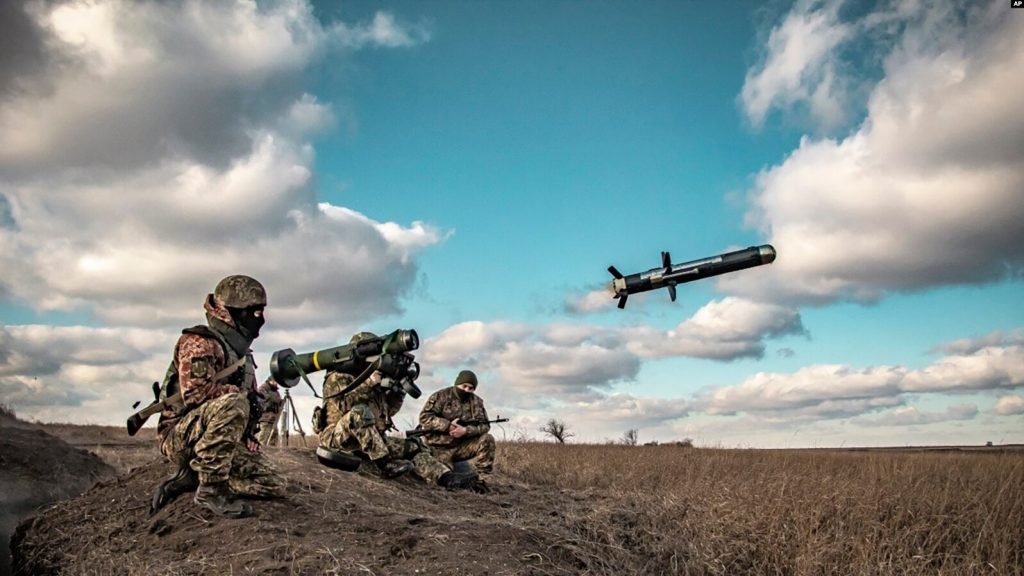The war in Ukraine has divided the Left more than any event in decades. While Ukrainian and Russian soldiers are facing off in the trenches, the international Left is waging its own battle: a war of analogies.
Is the Ukraine War comparable to the Vietnam War? Is Ukraine’s fight like that of China during World War II? Or do Belgium and Serbia in World War I offer a better analogy? Comparison is how everybody makes sense of the world — Marxists are no exception. As Leon Trotsky said,
Not to resort to analogies with … past epochs would mean simply to reject the historical experience of mankind. The present day is always different from the day that has passed. Yet it is impossible to learn from yesterday in any other way except by the method of analogy.
From the beginning, Left Voice has opposed Putin’s reactionary invasion of Ukraine while also opposing the NATO bloc. This is a war between capitalists, with U.S. imperialists on one side and Russian oligarchs on the other. They are willing to sacrifice tens of thousands of Ukrainian and Russian soldiers to increase their profits and geopolitical influence. The working class has nothing to win in that war. On the contrary: it’s only by opposing all capitalist governments that the working class can put an end to the bloodshed with a revolutionary struggle. As Trotsky put it back in 1938, when Ukraine was being crushed by Stalinist oppression, a free and independent Ukraine can only be won with “complete independence of the proletarian party as the vanguard of the toilers!”
While we say “Neither Putin nor NATO!,” a different sector of the Left argues that Ukraine is waging a war of national liberation against an imperialist aggressor, similar to the anti-colonial struggles that took place throughout the 20th century. This is the position of groups including Tempest and Workers Voice. And there is broad agreement that socialists should support wars of national liberation. Ever since the founding of the Communist International in 1919, socialists have been very clear that unconditional support should be offered to all struggles against imperialism, even when these are led by reactionary forces.
From Hanoi and Saigon …
There have been certain historical examples in which an anti-colonial movement has gotten arms from a competing imperialist power. In the leadup to the Easter Rising of 1916, for example, Irish Republicans attempted to get arms from Germany for their struggle against the British Empire. V. I. Lenin defended this uprising as completely legitimate, despite its links to the kaiser. We can find many other examples of Marxists defending the right of a people fighting imperialism to get arms from anywhere they can. 1We analyzed Trotsky’s essay “Learn to Think” in one article and looked at the Trotskyists’ positions on the Chinese war of liberation against Japan in another. We will not repeat those arguments there.
In the last year, the U.S. government has sent tens of billions of dollars’ worth of weapons to Kiev. Now, weapons shipments from NATO would not, by themselves, preclude socialists from supporting Ukraine’s war effort. But the crucial question remains: Are these arms being provided for a just war of liberation?
Writing in Tempest, Nate Moore argues that “U.S. based socialists should not be opposing arms to Ukraine despite the inter-imperialist dynamics unleashed by the Russian invasion.” Moore lists several cases in which anti-colonial movements got weapons from foreign powers, including the Vietnam War:
During the Vietnam War, the USSR and China, in competition with one another and with U.S. imperialism, delivered arms to the Vietnamese to fight the U.S. Although these were oppressive societies, third camp socialists did not advocate preventing arms from being sent to the Vietnamese resistance.
And this is true: socialists around the world called for “weapons for the Viet Cong,” i.e., the National Liberation Front fighting the pro-imperialist puppet government in South Vietnam. Even socialists who opposed the Stalinist leaders of the Soviet Union and China cheered on the Vietnamese liberation fighters.
The analogy, however, has some very serious limitations. The Viet Cong was a mass movement of peasants and workers under the leadership of a Stalinist party aligned with Moscow. These Stalinists had already expropriated the big landlords and capitalists in the northern part of their country. The war against the U.S. occupation forces in the South enjoyed huge popular support because it was not just a fight for formal independence. (South Vietnam, after all, was technically an independent country.) They were fighting for liberation from imperialist exploitation. This overwhelming moral force is why an army of peasants could defeat the world’s largest imperialist military apparatus.
Vietnam’s war effort was supported by the Soviet Union and to a lesser extent by the People’s Republic of China. Moore writes that these were “oppressive societies,” which is true but also very imprecise. The Soviet Union had been created by the workers’ revolution of 1917. Because the new workers’ state was isolated, a bureaucracy under Stalin had politically expropriated the working class in a bloody counterrevolution. But the economic foundations of a socialist society — a planned economy, a monopoly on foreign trade, etc. — remained in place. The People’s Republic of China, in contrast, had emerged from a peasant-based revolutionary struggle. In China, Stalinists established a bureaucratically planned economy from the outset. The resulting society was similar to that of the Soviet Union, but there were no workers’ councils for the Stalinists to crush.
To understand these contradictory social formations, we say that the USSR and the PRC were degenerate and deformed workers’ states. Throughout their histories, these states did carry out wars of conquest. But this was not “imperialism” in the Marxist sense of the word. Imperialism is not just warmongering — rather, it is a form of international exploitation based on finance capital’s need to constantly expand. The USSR and the PRC had no finance capital. Wars conducted by these states were about protecting the interests of the ruling bureaucracies, who were dependent on the planned economies. This is why they offered support to the Vietnamese struggle to expel imperialism and expropriate big landowners.
… to Kiev and Donetsk
Is anything comparable happening in Ukraine today? The Zelenskyy government is not fighting to free Ukraine from imperialist domination. Quite the opposite: its stated goal is to integrate the country into imperialist alliances like NATO and the EU. The right-wing government is abolishing laws that protect workers and farmers so that imperialist corporations can better suck the country dry.
The contrast could not be greater: the Viet Cong were fighting for the expropriation of big landlords in the interest of peasants. Zelenskyy’s government is fighting to expropriate small farmers in the interest of land-grabbing multinational agribusinesses.
It is no coincidence that the Soviet Union supported the Vietcong, while U.S. imperialism supports Zelenskyy. It has to do with the class character of these societies.
The Vietnamese were fighting against imperialism. The Ukrainian army is fighting for imperialism. This is why the political dynamics of the two wars are vastly different. In Vietnam, masses of people became communists (unfortunately of the Stalinist variety). In Ukraine, in contrast, Nazi forces have grown substantially, while most leftist parties have been banned. Victories by the Vietnamese weakened imperialism for the following decade; partial victories by Ukrainian forces have strengthened NATO and massively increased in Western military budgets.
If comrade Moore applied his logic to Vietnam, he would likely have found himself in solidarity not with the Stalinist-led government in the North, but rather with the pro-imperialist government of South Vietnam. The puppet state in the South was claiming to defend “democracy” against “totalitarianism,” in alliance with U.S. imperialism. Zelenskyy has much more in common with Ngo Dinh Diem than with Ho Chi Minh. 2On a side note: Moore refers to a tradition of “third camp socialists” supporting the liberation struggle in Vietnam. This term refers to socialists who broke with Trotsky’s analysis of Stalinism, which we sketched above, and instead argued that the Soviet Union represented “state capitalism” or some kind of new class society. It is, unfortunately, not true that “third camp socialists” supported Vietnam. Max Shachtman by that time had become a defender of “democracy” against Stalinism, so he was a virulent supporter of U.S. imperialism and its barbaric crimes in Vietnam. Hal Draper recoiled from Shachtman’s reactionary views and developed extremely muddled positions. The tendency led by Tony Cliff, the International Socialists, did support the Viet Cong but never came up with a theoretical justification for their position. Cliff had refused to support the Stalinist-led national liberation movements in Korea or in Cuba, claiming that these were “state capitalist.” How would that logic apply to Vietnam? If Vietnam was divided between two “capitalist” governments, each backed by an “imperialist” power, why support one over the other? Cliff’s sudden shift regarding Vietnam can only be explained by opportunism: the Vietnamese cause was extremely popular in the student movement at the time. This is an important example of how the theory of “state capitalism” leads socialists to bad positions — but that is a topic for a different article.
An Anti-imperialist or a Pro-imperialist War?
In more than a year of the Ukraine war, we have seen how imperialist support has strengthened Zelenskyy’s right-wing government and allowed it to carry out neoliberal attacks against workers and peasants. Ukraine today is nothing more than a protectorate of U.S. imperialism, and even if it could secure a resounding victory against Russia, the country’s budget would be controlled by Washington via the foreign debt, the IMF, and similar instruments. Moore does not dispute that this has been the dynamic of the last year. Yet he maintains that this war to subordinate Ukraine to Western imperialism can somehow be transformed into a war of liberation:
An implicit assumption of the “stop U.S. arms” position is that Ukraine will not be able to confront U.S. imperialism because the aid received heretofore has overly strengthened the U.S. imperialist position and control over the Ukrainian state. This not only projects a future that is unknowable, but worse, expresses little confidence in the Ukrainian people to struggle — a patronizing and condescending position directed at a nation that has reversed Russian military success since the invasion.
This is totally wrong. We have enormous faith in the power of the Ukrainian working class to struggle. We think Ukraine’s proletariat can lead a struggle for genuine independence — which would mean not only repelling the Russian invasion forces but also breaking with NATO and its lackey to nationalize imperialist capital. Moore, in contrast, seems to think that Ukraine as a formally independent, semicolonial vassal state of NATO is a goal worth fighting for. True “self-determination” will never come at the hands of a capitalist state.
Throughout his article, comrade Moore reduces all classes in Ukraine with their antagonistic interests and all national groups to a single “Ukrainian people.” An oligarch who is hoping to scrape up billions in trade deals with the EU, it would seem, is the same as a poor pensioner who wants the bombing to end. A Nazi paramilitary armed with rocket launchers made in the United States is the same as a trans person who would like to flee the country. Moore has nothing at all to say about a significant minority in Ukraine who prefer Russia — they are presumably excluded from the “Ukrainian people” whom he claims to speak for.
Weapons or No Weapons?
In this war, Left Voice has been sticking to long-standing socialist principles: “Not one person and not one cent for militarism!” This means we also oppose weapons shipments from NATO countries to the Ukrainian government, just like we oppose Putin’s reactionary invasion. We have shown that workers can stop the war machine, highlighting actions by workers in Greece and Belarus.
The Biden administration is not spending billions on weapons out of concern for democracy. This is part of an imperialist strategy intended to weaken Russia and ultimately China. Imperialism, as understood by Marxists, is not limited to military maneuvers. U.S. imperialism controls Ukraine via political and financial means. On this question, we have no differences with comrade Moore:
The U.S. naturally has imperial interests in this conflict. Through arms and aid to Ukraine, it hopes to strengthen its position against Russia over the long term.
Moore nonetheless writes that since “the U.S. and NATO have not invaded Ukraine,” this is not (yet) an inter-imperialist conflict. His conclusion is that we do not need to oppose our “own” government. Instead, he argues we should “not oppose” the Biden administration’s policy of ever-growing arms shipments. Moore continues:
Does supporting U.S. arms to Ukraine mean that we should explicitly call on the U.S. state to send arms? No. We are leaving that to the Ukrainians. Our role is to not get in the way of their legitimate self-defense.
So we should not call for arms shipments — but we shouldn’t oppose them either. We should be neutral (passively supportive?) of White House policy. But if Moore is serious about supporting the demands of the “Ukrainian people,” then he must see that most Ukrainians are in favor of NATO weapons shipments. Plenty of self-described socialists in Ukraine are asking people like Moore to pressure NATO governments to send more weapons. Why would he refuse such a request? If he thinks these weapons are playing a progressive role, he should be agitating for them openly.
Socialists and Weapons
The International Workers League (LIT-CI), the international tendency of the U.S. group Workers Voice, is at least consistent here: their support for the “Ukrainian resistance” does not know any such limits. They openly call on U.S. imperialism to increase weapons shipments — besides modern tanks, they demand fighter jets as well. One wonders: Why not nuclear weapons, comrades of the LIT-CI? That would certainly put a brake on the Russian invasion.
The LIT-CI acts as if fundamental opposition to NATO could be combined with support for NATO’s central policy for the last year — as if they could cheer for increased military spending for Ukraine’s army (which hopes to join NATO as soon as possible), while somehow opposing NATO. While we have always criticized Bernie Sanders and other “socialists” in the Democratic Party for voting in favor of U.S. military spending, a hypothetical LIT-CI representative in Congress would need to be voting alongside Democrats and Republicans for billions more to go to U.S. arms manufacturers.
These comrades pretend that they are supporting not the Zelenskyy government but rather some mythical “Ukrainian resistance” that is independent of Zelenskyy and NATO. In several statements, they have failed to say who might make up such a “resistance.” The only forces on the ground are the Ukrainian army and militias under strict government control — the only groups that have any kind of autonomy are the Nazis!
In a different statement — polemicizing with Gilbert Achcar, who has similar reservations as Moore about campaigning for ever larger weapons shipments — the LIT-CI wrote:
We believe that it is absolutely correct to mobilize to demand that all governments (including those of NATO member countries) deliver to the Ukrainian resistance arms.
Mobilizing for more weapons shipments? We note that Workers’ Voice, the sympathizing section of the LIT-CI in the U.S., has not taken up such a campaign. They generally don’t publish many of the LIT-CI’s articles on Ukraine on their website and seem embarrassed by the idea of campaigning in support of Biden’s policies. It’s positive that Workers’ Voice is ignoring the LIT-CI’s positions here. As internationalists, however, this blushing silence about their international organization is diplomatic and depoliticizing. Workers’ Voice should say openly why the LIT-CI is wrong here and that they will not carry out any such campaign to encourage the White House to continue and intensify its policies.
Totality
In his 1967 postscript to his study of Lenin’s thought, Georg Lukács highlighted the category of the “totality” as key to Leninism:
It is the totality which correctly points the way to the class-consciousness directed towards revolutionary practice. Without orientation towards totality there can be no historically true practice.
None of the socialists who support Ukraine’s war effort are considering the totality. They want us to see this war as a conflict between two unequal states — not as part of growing tensions between the Great Powers in a time of declining U.S. hegemony. In other words, they want us to look at an arbitrarily defined part of the war, separate from the totality of global imperialism.
Empirically, this is humbug. The Pentagon leaks confirmed that all major imperialist powers are very active in Ukraine, including with their own military personnel. Ukraine’s offensives are being planned in Washington.
Here, the LIT-CI has a particularly strange position. They ask what would happen “if NATO attacks Russia,” and answer as follows:
In this situation, Russia would have to be defended, because it would mean the aggression of the imperialist NATO against a weaker and more dependent country (Russia). In other words, we would be for the defeat of NATO.
Thus, if U.S. troops were to fire on Russian forces, the LIT-CI would turn 180 degrees: They would stop supporting Zelenskyy and immediately align themselves with Russian forces. The problem, of course, is that there is no clear line between imperialist “support” for Ukraine or direct imperialist intervention. Both of the LIT-CI’s positions, support for Ukraine or hypothetical support for Russia, are wrong. They are the result of extremely mechanical thinking that fails to understand the totality of the global situation.
Serbia
Like the Ukraine war, the First World War led to historic debates on the Marxist Left. In 1914, there was a legitimate war of national liberation by the Belgian people against an unprovoked German attack and occupation. Serbia was also waging a war of national defense against an imperialist power, Austria-Hungry, that wanted to devour it. Had Lenin and other Marxists attempted to look at either of these partial conflicts in isolation, they would have needed to give full support to the Belgians and Serbians. But they recognized this would have meant placing themselves on the side of the imperialist Allies.
As most socialists would agree today, World War I was not a series of isolated wars of national liberation — it was a global conflict among imperialist powers. Socialists needed to fight for the defeat of their “own” bourgeoisie. This included the socialists in Serbia, who bravely opposed “national defense” even when the “fatherland” was threatened with destruction. Rosa Luxemburg praised the Serb socialists for voting against war credits. This position makes sense only if we look at the totality.
Today, socialists in the NATO countries need to oppose their “own” imperialist power. As the tensions between the Great Powers increase, we will see new conflicts and wars — and each imperialist power will try to present their aggression in the name of “democracy” and “self-determination.” That has always been the language of war propaganda.
Socialists need to fight for an independent position. This applies to Ukraine as well, where socialists need to fight for the working class to become an independent political factor, with a perspective of liberating the country from both NATO and Russian imperialism. This is the only way to put an end to reactionary wars.
We encourage comrades in Tempest and Workers Voice who are unhappy with their groups’ positions — and we respect these comrades enough to know that many of them feel deeply uncomfortable with the official line — to carry out this debate.
Notes
| ↑1 | We analyzed Trotsky’s essay “Learn to Think” in one article and looked at the Trotskyists’ positions on the Chinese war of liberation against Japan in another. We will not repeat those arguments there. |
|---|---|
| ↑2 | On a side note: Moore refers to a tradition of “third camp socialists” supporting the liberation struggle in Vietnam. This term refers to socialists who broke with Trotsky’s analysis of Stalinism, which we sketched above, and instead argued that the Soviet Union represented “state capitalism” or some kind of new class society. It is, unfortunately, not true that “third camp socialists” supported Vietnam. Max Shachtman by that time had become a defender of “democracy” against Stalinism, so he was a virulent supporter of U.S. imperialism and its barbaric crimes in Vietnam. Hal Draper recoiled from Shachtman’s reactionary views and developed extremely muddled positions. The tendency led by Tony Cliff, the International Socialists, did support the Viet Cong but never came up with a theoretical justification for their position. Cliff had refused to support the Stalinist-led national liberation movements in Korea or in Cuba, claiming that these were “state capitalist.” How would that logic apply to Vietnam? If Vietnam was divided between two “capitalist” governments, each backed by an “imperialist” power, why support one over the other? Cliff’s sudden shift regarding Vietnam can only be explained by opportunism: the Vietnamese cause was extremely popular in the student movement at the time. This is an important example of how the theory of “state capitalism” leads socialists to bad positions — but that is a topic for a different article. |











